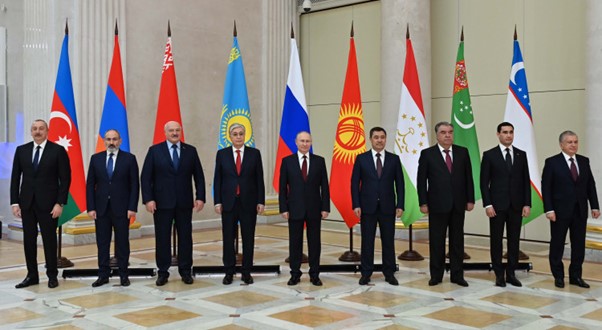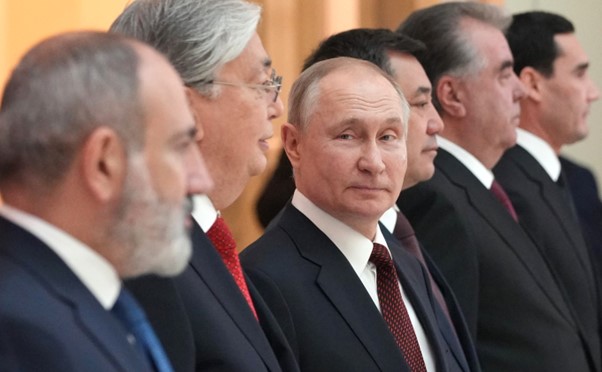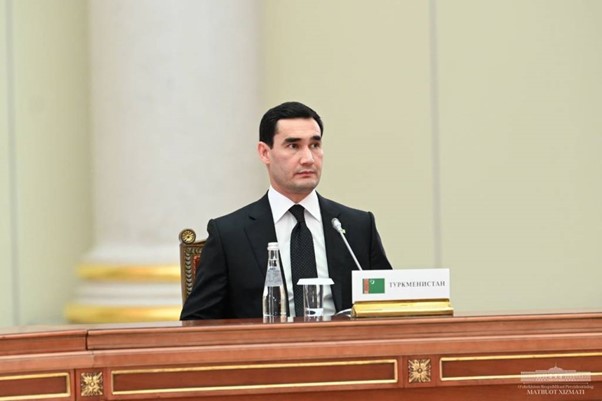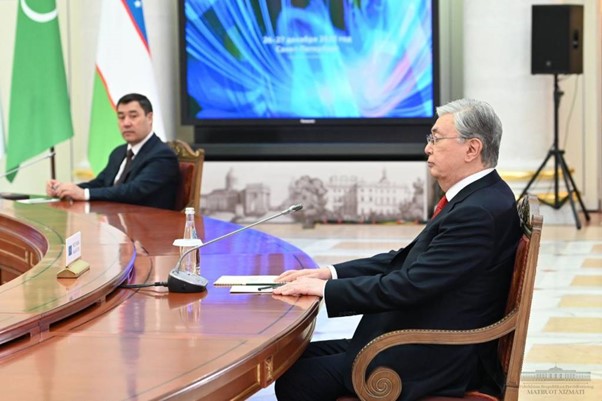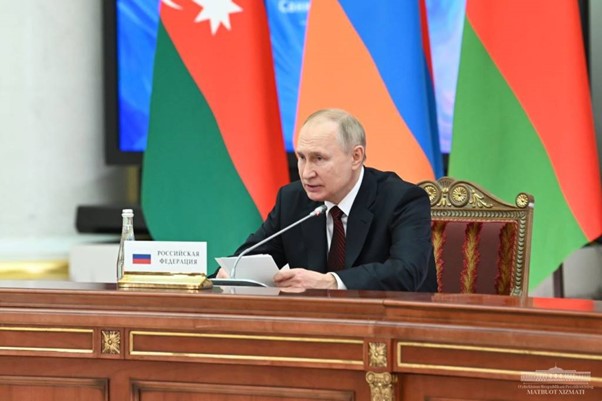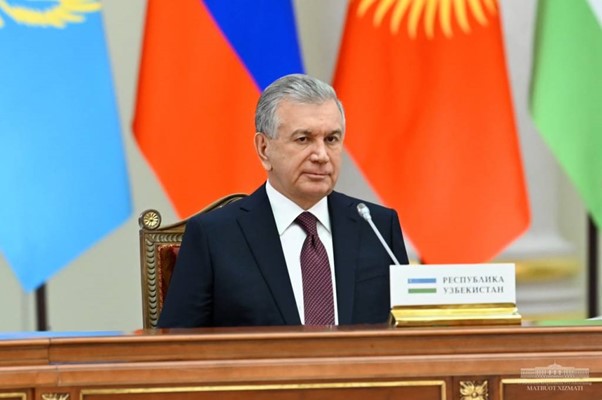nCa Report
An informal meeting of the leaders of the countries participating in the Commonwealth of Independent States took place at the Boris Yeltsin Presidential Library in St. Petersburg.
The meeting was attended by Vladimir Putin, President of Azerbaijan Ilham Aliyev, Prime Minister of Armenia Nikol Pashinyan, President of Belarus Alexander Lukashenko, President of Kazakhstan Kassym-Jomart Tokayev , President of Kyrgyzstan Sadyr Japarov , President of Tajikistan Emomali Rahmon, President of Turkmenistan Serdar Berdimuhamedov and President of Uzbekistan Shavkat Mirziyoyev .
The traditional informal meeting of the CIS heads of state is taking place in St. Petersburg on 26–27December.
* * *
Vladimir Putin: Dear colleagues! Dear friends!
First of all, I want to express my gratitude to all of you for accepting the invitation and coming to St. Petersburg for the already traditional informal New Year’s Eve meeting of the leaders of the Commonwealth of Independent States.
The fact that we once again gathered in such a friendly circle, in my opinion, eloquently testifies to our desire to further jointly build cooperation in the CIS space in the spirit of a true strategic partnership, mutual benefit and consideration of the interests of all countries.
Therefore, I propose today to sum up together the work of the Commonwealth of Independent States in 2022, talk about plans for the future and, of course, discuss issues of concern to all of us on the regional and international agenda.
In the outgoing year, the multifaceted interaction of our states developed successfully on the whole. This confirms the steady growth of trade between us and Russia with all CIS countries.
In January-October it increased by 6.6 percent to $81.5 billion. There are reasons to expect that by the end of this year it will reach $100 billion.
All this is happening against the backdrop of a difficult situation caused by volatility in global markets, unfavorable global economic conditions, as well as sanctions pressure from some countries. The CIS countries began to more actively switch to national currencies in mutual settlements.
Through the Commonwealth, coordinated measures were taken aimed at import substitution and ensuring technological sovereignty, independence, building up joint industrial production and scientific potential.
As a result, the economic and financial sovereignty of the Commonwealth states has been strengthened. Domestic markets for goods, services and capitals developed dynamically. Deepened regional integration.
Another key area of cooperation between the CIS countries is the maintenance of security and stability in our common Eurasian region. Unfortunately, the challenges and threats in this area, primarily from outside, are only growing every year. We have to admit, unfortunately, that disagreements also arise between the member states of the Commonwealth.
The main thing, however, is that we are ready and will cooperate. And even if any problematic issues arise, we strive to solve them ourselves, together, jointly, providing each other with comradely assistance and mediation assistance.
It is in this constructive vein that the Commonwealth countries interact on the subject of combating terrorism and extremism, cross-border crime, drug trafficking and corruption. I will mention that this year, as before, close operational contacts were maintained between the national security agencies and special services, as well as other structures responsible for ensuring law and order and internal stability.
It should be noted with satisfaction that the cooperation of the CIS states also covers such an important area as the preservation of a single cultural and humanitarian space, the expansion of various exchanges between citizens. Our peoples are indeed connected by a lot: a common history, spiritual roots, a deep interweaving of cultures and customs, values and traditions – and, of course, the Russian language, which is a powerful unifying force that holds our multinational states together.
Let me remind you that earlier at one of the summits we decided to hold the Year of the Russian Language in the Commonwealth countries in 2023. I would like to thank you all for supporting this initiative.
A very extensive program of measures has been developed to support, preserve and enhance the status of the language as a language of interethnic communication, to promote our achievements in the field of culture in every possible way. The holding of such events will contribute to the spiritual and cultural mutual enrichment of the CIS states.
In conclusion, I would like to reiterate my confidence that deepening cooperation within the CIS meets the fundamental interests of the peoples of our countries, helps to more effectively solve the problems of socio-economic development of the Commonwealth states and strengthen regional stability and security.
Dear friends, thank you again for responding to the invitation to come to St. Petersburg. It was a common desire, we have repeatedly returned to this, but still, formally, this is an initiative of Russia, and I am grateful to you for its support.
And from the bottom of my heart I wish you a Happy New Year. I wish you, your relatives, friends, citizens of your countries health, happiness, well-being and prosperity.
Thank you for your attention.
If anyone wants to add something, please, please.
Kassym-Jomart Tokayev: Since Kazakhstan chaired the Commonwealth of Independent States this year, I would like to say just a few words.
First of all, of course, I am grateful to Vladimir Vladimirovich Putin for the invitation and warm welcome in this historic city. Our meetings are becoming a tradition, as you rightly noted. These meetings provide a good opportunity to exchange views on topical issues of cooperation within the CIS and outline tasks for the future.
The outgoing year turned out to be difficult for the entire world community, and in these conditions, within the framework of its chairmanship in the CIS, Kazakhstan took a number of specific measures to strengthen the potential of the Commonwealth. During the year, over 80 major events were held, numerous initiatives were implemented aimed at expanding economic cooperation, maintaining close humanitarian ties and strengthening the authority of the organization. Our joint efforts are reflected in the documents adopted following the results of the Astana Summit in October.
Particular attention throughout the year was paid primarily to the implementation of the tasks of the CIS Economic Development Strategy until 2030. All these steps, in our opinion, have borne fruit. I would like to note with satisfaction that Kazakhstan’s trade with the CIS countries grew by 11 percent in January-October, reaching almost $30 billion. For the same period in 2021, this figure amounted to $26.5 billion, that is, an increase of about $5 billion is a good trend.
I would like to draw attention to the creation of favorable conditions for trade. We believe that we should work substantively to eliminate tariff and non-tariff barriers, to prevent protectionism, and to establish cooperation in matters of food security. The ministerial conference of the CIS countries, which will be held in Astana next year, will be devoted to the search for common approaches in this area. We hope, of course, for the active participation of the relevant ministers.
New mechanisms and formats of cooperation are needed to improve the efficiency of transport and logistics projects in the CIS. Here, the North-South international corridor is of particular importance, in which the Kazakhstan-Turkmenistan-Iran railway is an important transport artery. We know that the Russian Federation has also shown a practical interest in the implementation of this project. Naturally, this is welcome.
Collaboration in the field of security is very important. The Program of Cooperation in Combating Terrorism and Extremism for 2023-2025, adopted under the Kazakh chairmanship, meets these challenges.
In order to adapt the organization to modern global realities, we will have to improve its potential and strengthen the positions of the Commonwealth in the international arena. In the near future, the preparation of documents on the establishment of institutions of an observer in the CIS and a partner of the Commonwealth will begin.
Of course, common cultural and humanitarian cooperation and, as you correctly noted, the strengthening of the language space in the CIS are of lasting importance. Here the role of the Russian language, of course, cannot be subjected to any doubt. Assigning the official status of “Cultural Capital of the Commonwealth” to St. Petersburg in 2023 will serve to strengthen cultural ties between the CIS countries.
I think that we will jointly think over an information agenda that would meet the interests of our states.
It is symbolic that in the coming year 2023 the Commonwealth will celebrate the Year of the Russian Language. Kazakhstan’s initiative to create an international organization to support the Russian language under the auspices of the CIS will receive practical development.
Of course, I would like to wish the distinguished Sadyr Nurgozhoevich Zhaparov great success with the forthcoming chairmanship of the Kyrgyz Republic in the CIS next year.
Thank you for your attention.
Vladimir Putin: Thank you very much for your speech and for your analysis of what was done in the previous year. For Kazakhstan as chairman, of course, this is very important, as well as for all of us, bearing in mind the resultsof our movement forward. [Transcript of remarks of President Putin and President Tokayev taken from the official website of the President of Russia – Kremlin.ru]
* * *
Summary of remarks of President Shavkat Mirziyoyev of Uzbekistan:
It should be noted that at present Uzbekistan is developing cooperation with partners within the CIS in three dimensions: in the field of politics and security, economic and humanitarian spheres.
The priority tasks are the formation of a full-fledged free trade zone and the strengthening of transport interconnectedness in the CIS space.
Much attention is paid to joining efforts in the implementation of national programs and strategies aimed at deepening industrial cooperation, ensuring food, energy and environmental security.
In recent years, Uzbekistan has stepped up its participation in the activities of the Commonwealth, has signed more than 40 multilateral agreements, and has also joined 23 sectoral bodies of the CIS.
In 2022, the trade turnover of Uzbekistan with the Commonwealth countries increased by a third, more than 1,000 joint ventures were created. [This passage taken from official news service of Uzbekistan UzA]
* * *
Turkmen official mass media doesn’t give the speech of President Serdar Berdimuhamedov, but covered the essence of the summit. Here is the relevant passage from TDH report:
Today’s informal summit meeting can be viewed primarily as another irrefutable evidence of the mutual desire and determination of the neighboring countries in the region to raise the traditional partnership to a qualitatively new level, to give it a businesslike and constructive character, taking into account the accumulated positive experience of working together, the achievements of national economies and, of course, the huge economic and resource potential.
Considering the Commonwealth of Independent States as an effective platform for open dialogue and long-term mutually beneficial cooperation, Turkmenistan invariably takes an initiative position in the implementation of the existing multifaceted potential of the Organization, regularly puts forward concrete proposals aimed at developing new forms of partnership that are in demand over time, and implementing promising joint projects.
It should be noted that it was Arkadag Berdimuhamedov who at one time focused on the importance of strengthening the economic component of cooperation between the CIS countries, putting forward the initiative to prepare a Declaration on Strategic Economic cooperation of the CIS member states.
This multilateral document was adopted following the results of the CIS Summit held in Ashgabat in October 2019, once again confirming the mutual desire of the Organization’s member countries to join efforts to maximize the existing economic potential and further expand traditional trade and economic ties.
The CIS Economic Development Strategy until 2030 is based on the key principles of the above-mentioned Declaration, which has identified transport, the fuel and energy complex, communications and communications, industrial cooperation, trade, innovation and technology as priority areas of cooperation.
These are the sectors where the CIS states can adequately compete in international markets and offer potential partners favorable conditions for productive cooperation.
Noting the importance of promoting the economic interests of the CIS beyond its geographical limits, integrating into joint projects of neighboring countries and neighboring regions, the Turkmen side has repeatedly emphasized that this primarily concerns the creation of transport and transit infrastructure, optimization and expansion of energy supplies, laying new communication lines and communications.
The decisive factor for successful cooperation in the above–mentioned areas is the active participation of the CIS countries in the formation of sustainable corridors in the North–South and East-West directions.
The CIS nations, united linked geographically and by historical ties of friendship and brotherhood, have objective advantages, the optimal use of which meets the interests of universal well-being.
According to the leaders of the participating countries, the CIS, due to its geopolitical and geo-economic positions, should play a more proactive role on the continent, act as an active participant in the development and expansion of trade and economic partnership between East and West, Asia and Europe.
The cultural and humanitarian sphere has always been an important component of the established constructive dialogue, because cooperation in the fields of science and education, culture and art, youth policy, as well as health and sports has been and remains an integral factor in bringing countries and peoples closer together, strengthening trusting relations between them.
Turkmenistan also stands for comprehensive stimulation and intensification of relations through parliaments, active use of the experience of the Interparliamentary Assembly of the Commonwealth for these purposes.
Turkmenistan stands for increasing the international prestige of the CIS, its positive impact on modern global and regional processes.
In this regard, the commitment to cooperation with the Commonwealth states to develop balanced solutions to pressing problems of humanity, primarily related to joint counteraction to dangerous challenges and threats of our time, ensuring universal peace, security and sustainable development, is indicative.
All these years, the CIS countries have been firmly defending the principles of equality and respect in interstate relations, advocating the establishment of a culture of peace and dialogue on the global agenda, strengthening stability and security on the planet, making a significant contribution to the implementation of the SDGs.
In this regard, their active and productive interaction on the platforms of international and regional organizations, the established practice of mutual support during the consideration and adoption of important resolutions of the United Nations General Assembly, voting on candidates for UN elected bodies are very indicative.
Noting the commonality of the goals and objectives, the participants of the current informal summit reaffirmed the readiness of the neighboring countries to give a new quality and content to the traditional partnership, taking into account the accumulated positive experience of working together.
In this regard, the parties stressed the need to strengthen political and diplomatic cooperation by intensifying contacts between the foreign ministries of the CIS member states, creating effective mechanisms for systemic multilateral political consultations.
During the discussion of priority areas of cooperation with a view to the near and long-term prospects, the heads of state expressed confidence that the current informal Summit will give a powerful incentive to further consolidate efforts and implement new important joint projects in everyone’s interests.
At the end of the program of the working visit to Russia, President of Turkmenistan Serdar Berdimuhamedov returned to Turkmenistan. ///nCa, 27 December 2022
Here are some photos from the event:
[Pictures credit Kremlin.ru, UzA, Kazinform]
